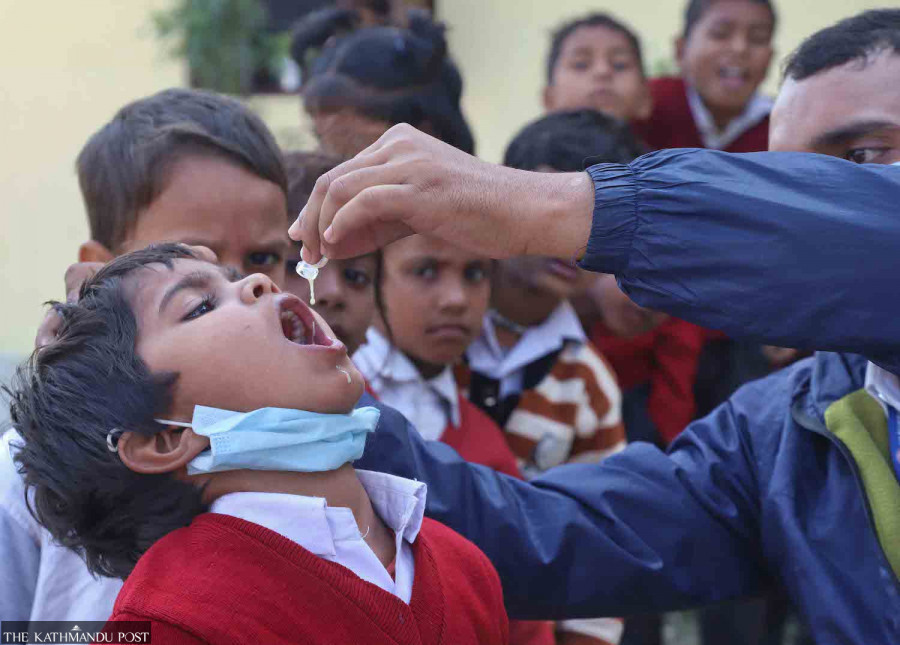Residents of Birgunj Metropolitan City, along with several local units of Parsa and Bara districts, are all set to be inoculated with an anti-cholera vaccine, as preparation to import doses at the earliest are in full swing.
Officials at the Family Welfare Division under the Department of Health Services said they have applied to the Department of Drug Administration, the national drug regulator, for approval to import the vaccine, and they expect the shipment to arrive before the Dashain festival, which is just over a week away.
“We have done our homework to administer the vaccine doses to at-risk populations,” said Dr Bibek Kumar Lal, director at the division. “We expect the arrival of vaccine doses before Dashain. Only the approval for vaccine import remains, and we have already started the process.”
Cholera is a highly infectious disease that causes severe diarrhoea and vomiting, which can lead to dehydration and death within a few hours if left untreated. The National Public Health Laboratory, which carried out testing on stool samples of the infected people, confirmed that Vibrio cholerae o1 Ogawa serotype is responsible for the outbreak.
At least four people have died and over 1,400 were infected from cholera outbreak in the first week of August in Birgunj metropolis and adjoining local units, and neighbouring Bara district.
Health authorities reached the conclusion that spread of infection could continue if vaccination is not started. Around a dozen people are still getting infected and hospitalised every day in the disease hit areas, according to health officials.
“Vaccination is an effective and proven method for the control of cholera,” said Lal. “Not only the government but also international aid agencies have agreed to vaccination and offered help for containment.”
The Global Alliance for Vaccine and Immunisation, Global Task Force on Cholera Control, International Federation of Red Cross and Red Crescent Societies, the World Health Organisation and the United Nations Children’s Fund have all agreed to support vaccine delivery and immunisation.
“We have done our part and are ready to begin the campaign as soon as the doses arrive,” said Dr Abhiyan Gautam, chief of the Immunisation Section at the Family Welfare Division under the Department of Health Services. “Over 1.8 million people from affected areas of Parsa and Bara districts will be inoculated.”
Alongside preparations for mass vaccination, several measures, including door-to-door awareness campaigns and the distribution of educational materials, have been launched in the affected areas, according to officials. Several teams of federal, provincial and local health workers, and the WHO are all working on the ground to help contain the outbreak.
Public health experts say the Birgunj outbreak is the largest since the Jajarkot epidemic in 2009. Sixteen years ago, the far-western district saw a major cholera outbreak that killed several and infected hundreds.
Experts say that the Birgunj outbreak exposes critical gaps in the government’s preparedness and response system, and water and sanitation conditions.
Experts are particularly alarmed by both the severity of the outbreak and the deaths it has caused.
Nepal often witnesses outbreaks of water- and food-borne diseases, including cholera, during the monsoon season as floodwaters contaminate most of the drinking water sources.
Last year, at least 95 cholera cases were confirmed in Kathmandu, Lalitpur, Jajarkot, Pyuthan, Makawanpur, Rolpa, Sindhupalchok, Achham, and Rautahat districts. The health ministry administered cholera vaccine to people from affected areas of Kapilvastu, Rautahat, and Kathmandu a few years ago to contain the further spread of the disease.
Experts say poor sanitation and hygiene make the country highly vulnerable to waterborne diseases, including diarrhoea, dysentery, typhoid, hepatitis, and cholera, especially in the monsoon season.
They say the risk of waterborne diseases will not decrease until the water and sanitation conditions improve, and people get safe drinking water. Several other factors, including storage conditions, supply pipes, and pollution of water sources, also impact the quality of water supplied to households.
The World Health Organisation says cholera is a global threat to public health, and a multifaceted approach is key to controlling the disease and reducing deaths.
